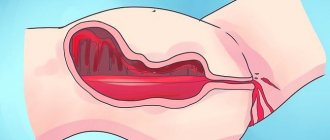Last update: 10/01/2019
Every second woman puts her body at risk when deciding to terminate an unwanted pregnancy. Modern medicine offers a gentle method of getting rid of the fertilized egg using hormonal drugs. However, it does not guarantee a 100% result and requires strict medical supervision of the procedure. Representatives of the fair sex are especially concerned about the question of when menstruation comes after medical termination of pregnancy.
- Pharmacological abortion: what is it?
- Pros and cons of medical abortion
- Restoration of the menstrual cycle
- What to do if menstruation does not occur
- Contraindications to pharmacological abortion
Pharmacological abortion: what is it?
Medical abortion is a forced termination of pregnancy using pharmaceutical means. Its use is indicated on the 42-49th day of delayed menstruation, which is equal to 6-7 weeks. The likelihood of successful completion of the procedure directly depends on the time of absence of menstruation: the shorter the delay, the higher the guarantee of termination of pregnancy. However, in some countries, pharmacological abortion is allowed up to 24 weeks.
Medical termination of pregnancy is carried out using medications whose main active ingredient is the hormone mifepristone, for example, Mifegin, Pencrafton, Mifeprex, Mifolian. The effect of hormonal drugs is to block progesterone, which leads to the rejection of the fetal egg and its release from the uterus, accompanied by bleeding. In turn, misoprostol replaces prostaglandin, which stimulates contraction of the uterine organ, which helps remove the remains of the fertilized egg from the uterus. Medicines are taken under the strict supervision of a doctor and according to a schedule, taking into account the individual capabilities of the woman.
After an abortion induced by medication, it is mandatory to undergo an ultrasound of the pelvic organs to check for the presence of remnants of the fertilized egg. If the uterine organ is clean, then the risk of complications is minimal. According to medical indications, for preventive purposes after a pharmacological abortion, additional therapy with antibacterial agents and for hormone levels is prescribed.
Menstruation after surgical abortion
This method of fetal extraction is the most dangerous, which can lead to damage to internal organs, especially when this operation is performed after the 15th week from the date of conception. Using a special instrument, the doctor opens the cervix and then removes the fetus. That is why the delay after such an operation is a normal process, which the doctor should warn the patient about.
If the critical days are not long in coming, but the discharge is very scanty and has a strong smell, this may mean that an infection has entered the uterus, which must be treated urgently. If treatment is not started on time, a woman may remain infertile forever.
Pros and cons of medical abortion
Any medical procedure has different consequences. For example, after a drug abortion, bleeding begins or, conversely, your period may not come. Therefore, it is necessary to know all the advantages and disadvantages of this procedure.
The main advantages of medical abortion include:
- High effectiveness of the technique. In 92-99% of cases the procedure is successful.
- Minimum or no preparatory activities.
- Painless and quick: the manipulation is reduced to the usual oral administration of tablets.
- No anesthesia or narcotic sleep is required.
- Exclusion of surgical curettage, which preserves the integrity of the cervix and endometrium of the uterus.
- No psychological trauma.
- Does not affect the reproductive functions and fertility of a woman.
However, there are also some disadvantages of pharmacological abortion that you should pay attention to before taking the medicine:
- Insufficient effect of the drug leads to the abandonment of the fertilized egg or part of it, the removal of which requires surgical intervention.
- High risk of uterine bleeding, fraught with heavy blood loss. In rare cases, surgery or blood transfusion is required.
- Severe pain in the lower peritoneum, which appears on the second day after taking the pills and is often accompanied by a feeling of discomfort and nausea.
- Body hyperemia and high temperature.
- Headaches and dizziness.
- Sudden jumps in blood pressure.
- Allergic reactions or individual intolerance to the drug.
- The hormonal nature of the pills leads to changes in the balance of hormones and threatens with unpredictable results.
- Infectious lesions of the female genital organs.
- Accumulation of blood clots in the uterine cavity, or hematometra, provoked by spasm of the uterine cervix.
- Difficulty in determining the arrival of menstruation.
In addition, it is not recommended to take medications that cause fetal rejection if the pregnancy is over 6 weeks. If the timing is inaccurate, the traditional method of abortion is used.
The timing of the onset of critical days after different methods of termination of pregnancy
Abortion is the premature termination of pregnancy. The main types of abortion are distinguished:
- medicinal;
- vacuum (mini-abortion);
- surgical.
Any type of abortion has an impact on the body: after it, a hormonal imbalance occurs, which can result in delays and atypical periods. The time frame for full restoration of the menstrual cycle after different types of abortion varies slightly.
Critical days after medical abortion
Abortion, which is carried out by taking medications, is considered the most gentle for the body. This type of abortion involves inducing a miscarriage. It is done quite early - up to 7 weeks. After an abortion, a woman experiences slight bleeding, which lasts up to 10 days. The next bleeding, already menstrual, usually comes after about a month. Delays from 2 weeks to 2 months are also considered the norm. If your period does not start on time, it is better to consult your doctor - he will determine whether your delay is normal. In addition, visit a specialist if there is a lot of bleeding after the procedure: this is an alarming signal.
After 30 days, your period begins. In principle, my cycle has not changed as usual.
Guest
https://www.woman.ru/health/Pregnancy/thread/3837290/
If a month after a medical abortion, menstrual discharge is too heavy, you should immediately consult a specialist
Critical days after a mini-abortion
Vacuum abortion is performed at 4–6 weeks and, as a rule, does not have a strong effect on the menstrual cycle. Menstruation normally occurs within 30–35 days, although sometimes there is a delay of 2–3 months even though doctors do not find any abnormalities. If a month has passed after the abortion and you still haven’t had your period, visit a doctor who can tell you the reason for the delay.
Vacuum abortion (mini-abortion) is the “suction” of the fertilized egg from the uterine cavity.
Some women notice that a mini-abortion has affected the intensity of their periods: they have become more abundant or, conversely, scanty. In addition, it is quite possible that at first the critical days will be more painful than before. In the first 10–15 days after a vacuum abortion, scanty bleeding or clear mucus streaked with blood is quite normal. This occurs due to the rupture of small vessels during the procedure.
I recently had a mini-abortion, the term was 5-6 weeks, the pain was unbearable. After the abortion, I had brown discharge for 7 days, then my period started 24 days later. They walked for 7 days and a lot. Then, after 24 days, brown discharge started again, and it continued for 2 weeks.
Kate
https://www.sikirina.tsi.ru/forum/abort-i-ego-posledstviya/posledstviya-posle-aborta10.html
In the first 10–15 days after a vacuum abortion, scanty bleeding or clear mucus streaked with blood is quite normal.
Critical days after instrumental abortion
Instrumental (surgical) abortion is the most difficult and dangerous for a woman. This operation is performed up to 12 weeks at the request of the woman and at any period for medical and social reasons.
During a surgical abortion, a woman’s uterus, especially the endometrium, is greatly injured, as the fetus is scraped out of its cavity.
Normally, after this type of abortion, your period should come in 28–35 days, but quite often they do not start on time. If several months have passed after the termination of pregnancy and you still have not had your period, be sure to visit your doctor. You may be prescribed special treatment to help restore your menstrual cycle.
Despite the onset of menstruation, the reproductive system has not yet had time to recover. During the first time after an abortion, a woman may observe changes in the volume of blood released from month to month. The cycle itself may sometimes fluctuate and not be accurate; your period will be more painful. This condition lasts from several months to six months.
After an abortion, you may notice dark red discharge with clots. This phenomenon is normal for 2 weeks after termination of pregnancy, but usually lasts only 2-3 days. The appearance of yellow discharge with an unpleasant odor should alert you. They say that an infection was introduced during the abortion process. Be sure to consult a specialist.
During the first time after an abortion, a woman may observe changes in the volume of blood released from month to month.
How to distinguish bleeding after an abortion from menstruation
Menstruation differs from discharge after an abortion in that it:
- begin no earlier than in a month;
- can be both scarce and quite abundant.
Bleeding after an abortion can be distinguished from menstrual periods in that it:
- takes from 1 to 14 days;
- initially it can be quite abundant, but later it can turn into a smear or become just streaks of blood.
Restoration of the menstrual cycle
All patients, without exception, are concerned about the question of when menstruation will begin after a medical abortion and how many days will it take for it to become established. After pharmacological termination of pregnancy, the menstrual cycle forms again. Its first day (1-2 days after taking the medicine) coincides with the onset of bleeding, signaling the detachment of the fertilized egg and the release of the egg. When menstruation begins, there is scanty bleeding, which should be replaced by heavy bleeding, which is a sign of the release of the female gamete. Then the vaginal secretions become spotty. Bleeding after a medical abortion usually lasts 7–10 days and indicates a gradual detachment of the endometrium. The intensity of blood secretion directly depends on physical activity. In this regard, after pharmacological termination of pregnancy, bed rest is recommended in the first two days.
It is impossible to determine exactly how long your period lasts after a medical abortion. The timing depends on the individual characteristics of the female body and is determined by lifestyle, physique, general health and age.
When menstruation arrives, a woman must strictly monitor the discharge. If they are scanty, this is not a very good sign, indicating closure of the cervix, making it difficult to expel the fertilized egg. Severe bleeding that does not stop for more than 2 days indicates a complication. In such cases, mandatory medical consultation is indicated.
Normal periods after medical termination of pregnancy begin according to the patient’s previously established menstrual cycle. The average time for the onset of real menstruation is on average 28 – 35 days. As a rule, it is painless.
According to medical statistics, 60% of patients regain their previous menstrual cycle. However, the onset of critical days has some features:
- A delay in menstruation after a medical abortion can be 10 days. This is considered normal.
- After this manipulation, it increases in most women. This physiological process is not a delay.
- Complete restoration of the menstrual cycle occurs within six months.
Delayed monthly bleeding may occur until the cycle stabilizes. If the delay in menstruation after medical termination of pregnancy continues for more than two expected periods of critical days, you must make an appointment with a gynecologist. Based on the results of a manual examination and ultrasound examination, if necessary, the doctor will prescribe medications to help restore the cycle.
The process of getting your period after a medical abortion
Any action that involves interfering with the female body can lead to unpleasant consequences. After a pharmaceutical abortion, menstruation is often delayed, which indicates disturbances in the functioning of the appendages.
Although pharmaceutical abortion is a gentler method than surgical abortion, the body requires time to restore its functions.
Until the onset of her first menstruation, a woman needs to carefully monitor her condition. If you experience pain, fever or other symptoms, you should immediately consult a doctor.
After a medical abortion, the cycle begins again. Usually 1-2 days after taking the drug, bleeding begins to bleed. This day will be the first day of your period.
It all starts with scanty bleeding, which gradually becomes more and more abundant. During the heaviest bleeding, a fertilized egg is released. The next period may come with a delay. Read more about menstrual irregularities→
The onset of menstruation may be associated with the following features:
- Delay of up to ten days after a medical abortion. This is considered normal and should not bother the patient.
- An increase in the cycle, which is mistakenly taken by a woman for a delay. In the vast majority of women, the cycle after pharmaabortion increases. This is not a delay.
- Within six months the cycle is restored.
Scanty periods after medical termination of pregnancy should worry a woman, just like heavy ones. It is worth taking a close look at the nature of the bleeding to inform your doctor.
What to do if menstruation does not occur
The use of medications during a pharmacological abortion does not guarantee one hundred percent termination of pregnancy. Many patient reviews prove that in 2% of cases the fertilized egg is not rejected. It persists if there is no period for a long time after termination of pregnancy with the help of medications, and the patient exhibits all its symptoms: toxicosis, dizziness, weakness.
If the interesting situation is confirmed by the doctor, then in this case he recommends terminating the existing pregnancy. In such a situation, the risk of abnormal fetal development increases. The decision in any case remains with the woman.
Medical termination of pregnancy is a consequence of hormonal imbalance, which can cause various female diseases. If the patient complains of deterioration in health, accompanied by an increase in temperature, cramping pain in the lower abdomen, then these symptoms may indicate complications of medical abortion, or more precisely, incomplete rejection of the fertilized egg from the uterine cavity. As a rule, such situations occur with late (over 8 weeks) pharmacological termination of pregnancy.
This pathology can only be diagnosed using ultrasound. Doctors recommend doing it twice: in the first 3 days after an abortion and on days 7–10.
The absence of menstruation for a whole month or more (over 40 days) is also a reason to consult a specialist.
A change in hormonal levels caused by taking medications increases the risk of getting pregnant again after an abortion (actually 1-2 weeks) before the onset of menstruation and is also accompanied by a delay. If symptoms accompany pregnancy, mandatory and repeated pregnancy tests and blood tests for hCG are indicated. Positive results are a signal to visit the gynecologist who performed the procedure.
Often, after a pharmacological abortion, doctors prescribe hormonal contraceptives to women to prevent pregnancy and normalize the menstrual cycle. A new conception within six months after an abortion is undesirable.
Regular visits to the gynecological office will help to avoid possible complications and reduce the likelihood of pathologies of the reproductive organs.
When do periods return after an abortion?
After the abortion procedure, the doctor should prescribe medications with which the body will recover, and should also be observed by a gynecologist for 2-3 months.
When does menstruation return after an abortion? This question worries probably every woman who has undergone a similar operation, in particular to make sure that the operation was successful. However, when critical days do not arrive for a long time, this may indicate several factors, for example, part of the fetus remains in the uterus or complications after surgery. How long it will take for your period to come after an abortion depends on many factors:
- patient's age;
- type of abortion procedure;
- presence of chronic diseases
- gestational age;
- qualification of a gynecologist.
The question of when your period will come after an abortion and how long it will last cannot be answered with certainty by any doctor.
Today, 3 types of abortion are used in medicine:
- vacuum;
- medicinal;
- surgical.
The method by which a pregnancy is terminated is chosen neither by the patient nor by the doctor. It all depends on how far along the woman is. And when your period should start after an abortion also depends on the method used.
Contraindications to pharmacological abortion
Medical termination of pregnancy is considered a gentle method, despite this there are a number of contraindications that exclude the use of this method of termination of pregnancy. These include:
- Abortion in the late stages of more than 8 weeks is dangerous due to incomplete rejection of the fertilized egg.
- Age restrictions: before the age of 18, medical termination of pregnancy is undesirable, since hormonal imbalance can harm a young, not fully formed body.
- Women over 35 who smoke are at risk of developing cardiovascular pathologies.
- Ectopic pregnancy. Medicines that cause rejection of the fertilized egg can cause the fallopian tubes to contract and cause them to rupture, the consequences of which (excessive internal bleeding) can be fatal.
- Hormonal imbalance caused by taking birth control pills or having an intrauterine device. You must inform your doctor about these factors.
- Infections and inflammations of the female genital organs (fibroma, fibroids, endometriosis, malignant tumors, uterine scar).
- Presence of chronic diseases:
- circulatory system (anemia, hemophilia);
- adrenal insufficiency accompanied by epilepsy;
- liver and kidney pathologies;
- diseases of the gastrointestinal tract (colitis, gastritis, pancreatitis);
- respiratory problems;
- diseases of the heart and blood vessels;
- hypertension;
- obesity;
- diabetes;
- extragenital pathology of severe form.
- Individual intolerance to drugs.
Abortion using medications can only be prescribed by a gynecologist. It is carried out in a medical institution so that in case of complications the patient can receive timely assistance from highly qualified specialists.
Take care of your health! Use contraception so as not to expose your body to the risk of developing pathologies.
How does abortion affect the female body?
Menstrual irregularities are one of the common consequences of abortion procedures. Menstruation after an abortion is irregular, ends suddenly or begins with delays.
The main reason why restoration of the cycle occurs with complications is damage to the mucous layer during the curettage process. The walls of the uterus are injured, scars and adhesions form on them.
Overgrowth occurs unevenly. For this reason, menstruation may be delayed after cleaning the uterus.
There are many ways to terminate a pregnancy, and depending on the option chosen, various complications arise. In any case, there are hormonal imbalances that provoke disturbances in ovarian activity, the development of dysfunction, endometriosis, endometrial polyps and many other pathologies. Excessive hormonal imbalance can lead to the formation of tumors.
Menstruation after medical abortion
According to gynecologists, medical termination of pregnancy is the most gentle option. No surgical intervention is performed. It is enough for a woman to take pills.
Pharmaboration is carried out for up to seven weeks. After taking the drug, the egg is rejected and leaves the uterus. For a week and a half after this, bloody and mucous discharge is observed, which many mistakenly call menstruation.
Your period will begin in about 30 days after a medical termination of pregnancy. The beginning of the cycle is considered to be the day you take medication. The normalization process is proceeding quickly. Sometimes there is a one-week delay in menstruation after a medical abortion. Such a violation is considered normal, but only on the condition that the discharge has not become more abundant than before the termination of pregnancy.
If after medical abortion the temperature rises, pain appears in the uterus and there is heavy bleeding with clots, you should immediately seek help from a gynecologist. Such symptoms indicate that there are embryonic remains in the organ.
Medical consultation is also necessary if menstruation has not started forty days after the procedure. It is possible that the termination was unsuccessful and the embryo remained in the uterus.
Vacuum
Vacuum aspiration is considered a relatively safe abortion option. The optimal period for the operation is five weeks. It takes three to five months to fully restore the cycle. The time frame for normalization depends on the state of health of the woman’s body.
The first discharge after a vacuum abortion should be expected on the 28th–35th day from the date of the operation. In this case, scant discharge is considered the norm, since the ovaries have not yet had time to fully recover. If menstruation appears of an unusual color and with an unpleasant odor, regardless of its quantity, you need to be examined by a gynecologist.
Surgical
Abortion surgery has adverse effects on the reproductive system. Often after it, heavy periods and a significant violation of the integrity of the uterine walls are noted. Surgical abortion performed at more than nine weeks is especially dangerous. The uterus is opened with special instruments, which can damage the cervical tissue.
After surgical interruption, a delay in menstruation is possible. Even an experienced doctor is not able to say exactly how long the absence of menstruation will last. If they do not appear within several months, you should definitely be examined by a gynecologist. After curettage, the uterus remains open, and infections can enter it without obstacles.
The meager nature of menstruation, which has a pungent odor or unnatural color, is alarming. Such symptoms indicate infection of the uterine cavity. Without proper therapy, a woman can become infertile.
Possible complications
Complications occur rarely . In hopes of reducing their risk, it is advisable to follow all doctor's recommendations. With a medical abortion, the most important factor is the length of time, up to 6 weeks. It is during this period that most cases of miscarriages occur, since the fetus is not formed and the egg is not well attached to the uterus.
One of the most common complications is incomplete abortion or continuation of pregnancy; an ultrasound is performed to make sure. In both cases, cleaning the uterus is required. Incomplete abortion can cause an increase in pathogenic organisms , creating favorable conditions for the development of infections.
To learn more about this topic, we suggest watching a lecture by a professor of gynecology.
If there is damage to the mucous membrane, purulent inflammation, endometritis, and salpingitis may develop. Even if the pregnancy remains and is developing, what was initially planned will have to be continued, since the likelihood of a disruption in the development of the embryo is very high. Individual intolerance to drugs can also be a complication .
To identify it, a woman needs to do special tests. Some experience vomiting and nausea. Others suffer from excruciating abdominal pain, which usually appears after taking prostaglandin and lasts several hours. Then it becomes less intense.
They reduce the effectiveness of the drug method. There are rare cases when an allergic reaction occurs to the components of the drug. When menstruation occurs after a medical termination of pregnancy, this is a normal process for the release of the fertilized egg. But it matters how long it takes to come out.
Modern medicine allows you to select drugs for each case
Too long and intense menstruation is a reason to consult a gynecologist . Because this fact can have serious consequences, such as blood transfusion. Infertility and hormonal imbalance occur very rarely, and are also difficult to treat and control.
When deciding to have an abortion, consider your doctor's recommendations. Do not self-medicate , it will not lead to anything good. Keep track of how and how long your period comes after a medical termination of pregnancy. If there are any deviations, contact a specialist.
We hope this material was useful to you. Watch your health and remember that complications can be avoided by seeking help in a timely manner .











